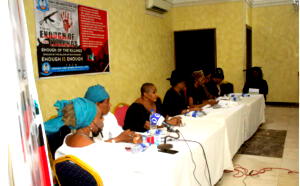Manufacturing declines as 2.27% GDP growth surpasses IMF projection— Punch, Tuesday, February 25, 2020, p 35. By Dele Sobowale A map of ...
Manufacturing declines as 2.27% GDP growth surpasses IMF projection—
Punch, Tuesday, February 25, 2020, p 35.
By Dele Sobowale

FOR a country so long starved of any good news, even a minor triumph must be celebrated by all of us. A buoyant economy is, after all, still one of the pillars of a good society – if it can be sustained. Any small step in the right direction must be applauded. So, let me congratulate the Federal Government for this very modest achievement.
But before the Aso Rock “loudspeakers” and the Minister of Information inundate the media with cheap propaganda, the following observations need to be made about this result, otherwise, you can trust the President’s “Three Musketeers” of propaganda to make it appear as if Buhari has achieved the economic miracle of the century.
“The International Monetary Fund had projected that the nation’s economy would grow by 2.1 per cent in 2019.” That is generally known by those who have paid great attention to our country’s economy.
Instead the economy expanded by 2.27 per cent. The positive difference was 0.17 per cent more than the IMF predicted. That again translates to 0.08 per cent more than the forecast by the global body. The right verdict on that result is: “good but not good enough.”
READ ALSO:Yahaya blames predecessor for NBS rating on corruption index in the state
Four reasons compel caution when Federal Government officials are going about beating their chests about the “great” result. It is in reality a woeful record except for the minor achievement which the National Bureau of Statistics, NBS, and our media had chosen to highlight. Let me quickly explain – even at the risk of being accused of pouring cold water on our enthusiasm for a joyful outcome.
To begin with, as a professional economic forecaster, having received training under Polaroid Corporation in the USA, during its heydays as one of the Fortune 500 leading global firms, I know that every future forecast carries a warning about the margin of error. Forecasters, whether at the World Bank, IMF or anywhere else, are human beings not “gods”.
They cannot foresee every detail of the future. IMF projections, when read in their entirety, invariably indicate the margins of error, plus or minus, from the figure published. The NBS would do Nigerians a lot of favour to publish the caveat. Then, it will be seen that what we have achieved might be just within the spread and nothing to cheer.
Second, granted the 2.27 per cent GDP growth surpasses the IMF estimate, but that is only one reason to be happy. It is not even the most important reason. The NBS should have done a better job with its report to Nigerians.
The Federal Government presented a budget which included several budgetary proposals. One of them and a fundamental one was the GDP growth projected for the year 2019. Deliberately or inadvertently, the NBS failed to announce that the 2019 Budget promised 3.2 per cent growth, but instead achieved only 2.27 per cent. The failure to achieve the budgeted GDP growth by almost 30 per cent was considerably more devastating than surpassing the IMF projection by 0.08 per cent.
I personally regard that report as being intellectually deceptive. It is leading economic-illiterate Nigerians to accept a colossal failure as a resounding success. It is shameful. Any organisation working on an annual budget sets a series of targets for itself. It must primarily measure its success or failure by the performance against the targets set forth in its budget before caring about what external institutions think of its ambitions.
Nigeria PLC under Chief Executive Officer, CEO, Muhammadu Buhari, promised to generate revenue of N10 trillion and to grow the economy by 3.2 per cent. The first question the NBS must answer for us is: were the major estimates, including the GDP growth promised achieved? This, the NBS failed to do. Instead, it went out of its way to hand the Federal Government a propaganda handle by focusing its report on a subsidiary matter. Even that was not well explained.
If a man stands with one foot in a bucket of boiling water, the other in a bucket of ice, statistically he is comfortable— Vanguard Book of Quotations, VBQ, p 233.
Third, certainly, the NBS is aware that with a growth of 2.27 per cent and population racing unchecked, Nigerians don’t need the World Poverty Clock and all other global institutions to tell us that we have added millions more people to the gargantuan number of those living in abject poverty.
The Director General of the NBS is a Statistician; not an economist. It might not occur to him that the issues that determine peoples’ economic welfare are not those data which don’t address the real concerns of jobs and income. The clever figures demonstrating that we beat IMF estimates can never translate into jobs for the people, especially the youth and leave the average Nigerian with income which can procure a basic means of existence.
There are three kinds of lies: lies, damn lies and statistics —Mark Twain, 1835-1910, VBQ 130.
Statistics are dangerous weapons; sometimes of mass destruction of intellect. To be quite candid, I find it difficult to understand what the NBS sought to achieve by that report instead of releasing one addressing all the items in the budget one by one and telling us what was achieved on each one – revenue generated, recurrent expenditure, capital expenditure, loan repayment, loans accumulated, jobs created etc. If they do, all the negative variances will show.
By the fourth quarter of 2019, the Minister of Finance had disclosed that less than 60 per cent of the 2019 revenue had been collected; similarly capital expenditure was less than half of the year’s budget, loan repayment was consuming a higher percentage of our revenue than what was budgeted. All the real and demonstrable pieces of evidence indicating a failed budget were there for all to see. NBS ignored all these and released the IMF story as if anybody ever took IMF to Cash N Carry. If they can summon the courage to tell the truth, the NBS should tell Nigerians that the 2019 Budget was a massive failure and they have the figures proving that. Why serve the nonsense about IMF?
On an annual basis it [the report] said oil recorded 4.59 per cent growth in 2019, when compared to 0.97 per cent recorded in 2018— Punch.
Finally, the report revealed the major source of our good fortune. It was crude oil whose contributions to the GDP increased tremendously on account of the turmoil in the Middle East late last year – US VS Iran, Iran vs Saudi). Every forecaster recognises that there are unpredictable events which could alter the results. The problems in the Gulf, which nobody could prophesy in advance, favoured our crude oil exports and propelled the 2.55 per cent growth recorded in the fourth quarter of last year. Nobody should take credit for a gift from God. In fact, the other face of Fortune is starring at us now as Coronavirus is devastating the world. The oil mini-bonanza we experienced in Q3 and Q4 last year might vanish in Q2 this year.
Without the robust contribution of oil in Q3 and Q4 last year, the IMF projection might have been right on the spot. Nigerians should be careful about the conclusions they draw from the report of the NBS published in most newspapers. They are subject to a great deal of misinterpretation.
Mainly, there is the risk that fellow Nigerians might read success into what was a woeful failure and give Aso Rock propagandists room to practise their trade once again.
The post Caution on 2019 GDP growth report appeared first on Vanguard News.

No comments